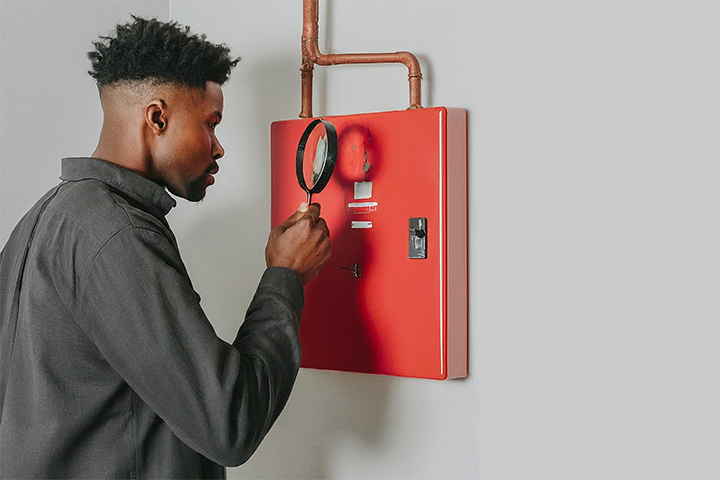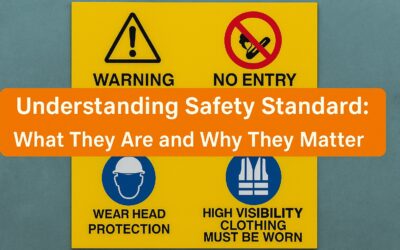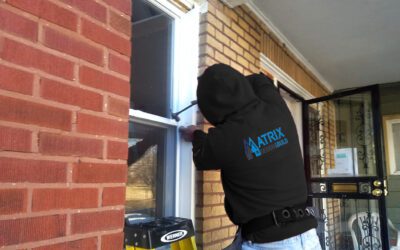Attention single-family and duplex owners: If you are reading this article to answer questions about your single-family home or Duplex, there might be a better article. We are focusing on commercial and multifamily buildings today!
Now, let’s get to the topic! Like silent protectors, fire alarm systems always watch for danger in buildings. These fantastic systems play a crucial role in protecting us from fires. They find fires, warn people to evacuate the building, and even call for help by sending a signal to firefighters, who rush to the scene as quickly as possible. These advanced systems use a network of devices, machines, and control panels to do these jobs.
Since the system has such a big job, ensuring it always works correctly is essential. How do we do that? By doing regular inspections! If you want to know more about inspections, keep reading!
How Do Fire Alarm Systems Work?
Let’s talk about how fire alarm systems do their job. Knowing this helps us understand their importance and be ready for an emergency.
These fantastic systems work in four main steps:
1. At the core of a fire alarm system are the initiating devices. These are like the eyes and ears of the system, spotting the presence of fire. They come in different types for different situations:
- Smoke detectors: The most common type, using photoelectric or ionization technology to sense smoke particles in the air.
- Heat detectors: These detect rapid temperature rises, ideal for areas where smoke might not be the first sign of fire, like kitchens or garages.
- Carbon monoxide detectors: These silent killers can be present even before flames appear, making these detectors crucial for early warning.
- Manual pull stations: You can activate the alarm if you spot a fire.
2. The info from these devices goes to the fire alarm control panel, the system’s brain. When the system alarms, devices like horns or bells should make loud sounds, and even flashing lights for those who can’t hear to warn everyone in the building.
3. The system should then call a monitoring company using telephone lines.
4. Some systems might also activate fire suppression systems such as sprinklers until emergency help comes.
Modern fire alarms are more than just noisy bells. They can find where the fire is, helping firefighters respond better. They can also work with other building systems. Doors can unlock, elevators can be called back, and ventilation can shut down to stop the fire and help people escape. Now, let’s move on to our main topic!
Figure 1
Fire Alarm System Inspection
Did you know that it is a requirement by Licenses and Inspections (L&I) that your system is tested and certified annually? As the building owner, you are responsible for having these systems certified.
A fire alarm system inspection thoroughly examines and assesses a building’s fire alarm system to ensure it’s functioning properly and is compliant with safety regulations. This inspection involves checking various fire alarm system components, such as smoke detectors, heat detectors, pull stations, control panels, alarms, and communication devices.
During the inspection, trained professionals assess whether all elements of the fire alarm system are in good working order, identify potential issues, and verify that the system meets the required standards and codes.
Fire Alarm System Inspection Requirements
Let’s answer the most common questions that come to mind when inspecting fire alarm systems according to L&I.
Who can inspect fire alarm systems?
Only licensed professionals can do the job. Look for a certified inspector or electrical contractor. To be a certified inspector in Philadelphia, refer to this link.
If you are not a licensed electrical contractor or a certified inspector, some companies annually inspect your system and provide certifications.
Which properties need annual inspections?
These properties include residential buildings with three or more units, mixed-use properties, and all commercial buildings like offices, shops, and restaurants. The only exception is single-family or duplex homes.
Smoke alarms in residential occupancies are exempt from this inspection if they are tested regularly by the building owner or tenant following the manufacturer’s instructions.
Additionally, occupants must test and replace batteries in battery-powered smoke alarms within their dwelling units. Owners are responsible for replacing non-operating smoke alarms within three days of receiving written notice.
How often should fire alarm systems be inspected?
Every year. Ensure your fire alarm gets its annual checkup to stay in top shape.
Regular inspections ensure your system functions properly, saving lives and potentially avoiding insurance disputes. It’s an investment in your building’s safety and peace of mind.
Fire Alarm System Inspection for Renovation Projects
When working on construction or renovation projects in Philadelphia, you typically need permits from L&I. If you have hired a general contractor, they are usually responsible for obtaining them. Throughout this process, you may encounter a hold on your permit application due to certification requirements. Specific tasks within the permit process require certification, and one of these tasks is installing a fire alarm system.
If your permit application displays a “hold permit completion” status with the “fire alarm” hold type, you may need to submit a fire alarm certification. Here is where you need to obtain a certificate. After getting the certificate, submit the certification form online via eCLIPSE and attach it to the permit marked “hold permit completion.”
Follow the step-by-step instructions in eCLIPSE to submit a permit inspection certification.
Note: Utilize construction inspection forms to inspect and certify new building systems or parts as part of the permit process.
The Process of Getting a Fire Alarm System Certification In Philadelphia
- Use eCLIPSE to submit forms online for the inspection. Ensure you use the legal address provided by the Office of Property Assessment (OPA).
- You need a contractor license to submit any certifications or reports.
- Follow the step-by-step instructions in eCLIPSE for submitting a fire protection certification.
- Once the inspection is complete, the property owner should receive a certification stating that the system passed the inspection or testing. Submit a copy of this certification to L&I.
- If the system fails the inspection, the property owner must fix the issues and get the system reinspected and certified. If the problems aren’t corrected within 45 days, the inspector must send a deficiency notice to L&I.
If you have any questions, you can email [email protected]
What Happens if You Miss Fire Alarm Systems Inspections?
Skipping fire alarm system inspections is risky and can lead to severe consequences.
- It can jeopardize your safety! Even minor problems can stop the alarm from working, blinding you to a fire.
- No insurance? No way! Most insurance companies require regular inspections. Miss them, and they might refuse to pay if there is a fire.
- Failing to prioritize inspections may result in business closure. Fires can devastate businesses. Inspections help prevent them, keeping your doors open and people working.
Are inspections a pain? Most companies can schedule them around your needs with minimal downtime. It’s a small price to pay for peace of mind, knowing your building and everyone in it is protected.
Studies show that many businesses do not reopen after disasters like fires. According to the Federal Emergency Management Agency (FEMA), 40% of businesses never open their doors again after a major disaster. Another 25% close within a year, even after trying to restart. Another study by the Small Business Administration found that over 90 percent of companies fail within two years of a disaster.
It is crucial to be prepared for the worst, as these numbers demonstrate the importance of readiness. Having a plan and taking precautions can make all the difference in helping your business survive. Remember, prevention is much easier than recovery after a disaster strikes.
Conclusion
We hope you found this article helpful. Here’s some advice: For your safety, consider installing a sound fire alarm system in every building you own, whether local codes require them.
Do this for your safety. Don’t skip a home inspection, even if it is not required. Tiny issues in your alarm can prevent it from saving you when it matters most. Regularly check your system; if you have any problems, get help from professionals. Your safety is valuable; always prioritize it!





![Top 20 Reasons for Failing a Plumbing Inspection in Philadelphia [2025 Guide]](https://matrixgc.com/wp-content/uploads/2025/05/Common-issues-causing-failing-a-plumbing-inspection-in-Philadelphia.png)

![Smoke Alarm Installation Requirements in Philadelphia [2025]](https://matrixgc.com/wp-content/uploads/2024/06/smoke-alarm-installation-400x250.png)

0 Comments